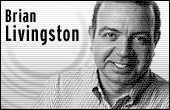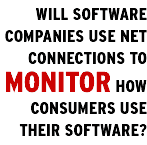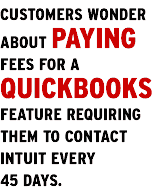| |||||||||

Intuit products "phone home" more often than you may like
 Users of a new financial package are crying bloody murder over an Internet "leash" the software requires--merely to keep it running. Users of a new financial package are crying bloody murder over an Internet "leash" the software requires--merely to keep it running.
People have kept track of their petty cash and payroll for years with QuickBooks, a package for small businesses, and Quicken, its sister product for individuals. The company that produces these two programs, Intuit, has distributed new versions regularly. But Intuit may not have been prepared for the howls of outrage that arose from thousands of small accounting firms when the latest version, QuickBooks 2000, was recently released For the first time, QuickBooks requires an Internet connection to Intuit at least once every 45 days to update its payroll tables. Intuit charges $6 per month for this service. Previously, it was possible to update the tables by mail or by buying a newer version of the software. As if this weren't bad enough, Intuit decided to charge a separate $6-per-month fee for each QuickBooks client. For example, a small accounting firm using QuickBooks 2000 to process 100 clients' payrolls would have to pay Intuit $600 per month, not $6 per month. To add insult to injury, QuickBooks 2000 now requires accounting firms to give Intuit the Employer Identification Number (EIN) of every company for which the firm handles payroll. A business's EIN can be used by a malicious person to commit credit fraud, says CPA Mike Block. He's certified by Intuit as one of more than 20,000 "Professional Advisers" for QuickBooks. And he played a major role in reversing some of what he considers to be the most objectionable aspects of the new QuickBooks.
In an interview, Intuit officials confirmed that on Feb. 14 they dropped the requirement for multiple $6-per-month fees Jennifer Mazzon, an Intuit product manager, explained, "We actually changed that policy in response to customer demand." This major victory for consumers of Intuit's financial products was almost certainly caused by a gigantic hue and cry in the Internet discussion group known as "biz.comp.accounting." Block, the owner of a Florida tax consultancy, BlockTax (no relation to H&R Block), is the moderator of the discussion group and led the battle against the new fees. But the war is far from over. Block and other Intuit customers say the company seems too eager to use the Internet to "lock in" customers. People are suspicious of the QuickBooks feature requiring them to click OK every 45 days to contact Intuit. This might be the first step in the collection of "marketing data" from their business transactions, they fear. Intuit's Mazzon strongly denied that the company collects any information from a person's PC during the 45-day update cycle. "Absolutely not," she said. Mazzon acknowledged, however, that Intuit does require the disclosure of a company's EIN before it can run QuickBooks 2000's basic payroll service for its own business or anyone else's. Intuit used to require only the serial number of a person's QuickBooks package to support it, Block says. His Web site details many other objections to the new policies. By the by, Block is a colorful figure in his native state of Florida, where he has led two successful citizen initiatives to cap tax rates. He's now found a new cause. Will software companies routinely use Internet connections to monitor and control how consumers use their software? This issue may turn out to be a 21st century battle royale.
biography |
|
|||||||||||||||||||||||
|
Send us news tips | Contact Us | Corrections | Privacy Policy |
|

